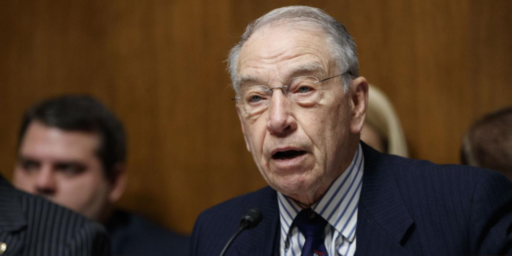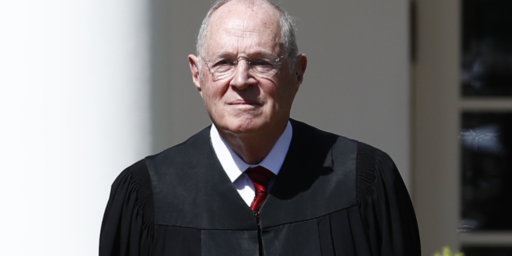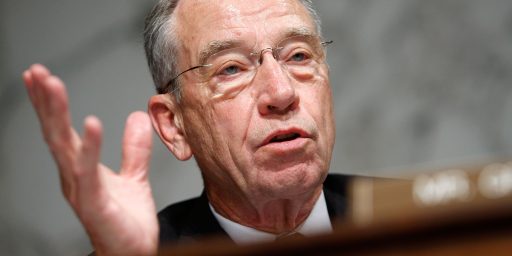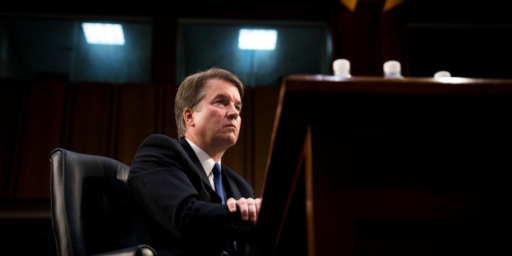American Political Realignment?
Michael Barone argues this morning that, “George W. Bush is a transformative president.” He points to the Social Security reform debate, which he thinks Bush is winning:
Democratic leaders’ “just say no” response grows weaker. Its weakness has already been demonstrated by the defeat of former Senate Minority Leader Tom Daschle in South Dakota. It is held up to ridicule by The Washington Post editorial page. Charles Grassley, the chairman of the Senate Finance Committee, where the first work on the issue will be done, is determined to get personal retirement accounts. The ranking Democrat on the committee, Max Baucus, is from Montana, a Bush state, and has worked with Grassley before. Favorable action is not assured. But it is possible.
It is possible also because Bush has already transformed the American electorate. On Election Day, John Kerry won 16 percent more votes than Al Gore did in 2000. George W. Bush won 23 percent more votes than he had in 2000. This is comparable to Franklin Roosevelt’s 22 percent gain in popular votes between 1932 and 1936. FDR created a New Deal majority that hadn’t existed before. Bush may have done something similar for his party. Bush carried 31 states that elect 62 of the 100 senators. He carried approximately 250 congressional districts, to about 185 for Kerry (the final counts aren’t in). Bill Clinton was re-elected with 49 percent of the vote in times of apparent peace and apparent prosperity — the most favorable posture in which to run. George W. Bush was re-elected with 51 percent of the vote in times not of apparent peace and apparent prosperity. Clinton’s 49 percent in retrospect looks like a ceiling for his party. Bush’s 51 percent may be more in the nature of a floor.
The one conspicuous failure of the Bush campaign was its failure to win the young vote. Bush’s personal retirement accounts are popular with young voters, and he now has the megaphone to speak to them.
I hope Barone is right about the Social Security issue but am pretty sure he isn’t. Further, to continually tout Clinton’s non-majority wins while ignoring the fact that a significant third party candidate siphoned votes from both candidates is disengenous.
Still, Barone’s larger point about a steady movement of the electorate toward the GOP is undeniable. A little over a decade ago, the idea that Republicans would soon control the White House, both Houses of Congress, a majority of the governorships, and a majority of the state legislatures was beyond belief. If Bush can manage to push through a substantial reform of Social Security, he would increase the GOP’s share of both the youth and senior cohorts, breaking the Democratic stranglehold on a key issue. The combination of that, real progress on making the party attractive to blacks and Hispanics, and the seeming determination of the Democrats to be a party of the radical left could well solidify the Republican party’s position as the majority party for years to come.





![McConnell, Other Republicans, Blocking Criminal Justice Reform [Updated: Vote To Go Forward]](https://otb.cachefly.net/wp-content/uploads/2018/12/Handcuffs-Jail-512x256.png)
A little over a decade ago, the idea that Republicans would soon control the White House, both Houses of Congress, a majority of the governorships, and a majority of the state legislatures was beyond belief.
In fact, the first thing I ever read, persuasively suggesting the possibility that the GOP could win majorities in Congress in 1994, was by Michael Barone.
“On Election Day, John Kerry won 16 percent more votes than Al Gore did in 2000. George W. Bush won 23 percent more votes than he had in 2000. This is comparable to Franklin Roosevelt’s 22 percent gain in popular votes between 1932 and 1936.”
However, Landon was only able to increase his vote by 5% over what Hoover had done 4 years before. So while Bush was able to increase his vote total by 7% over Kerry, FDR increased his vote 17%.
I think Barone is drinking waayy too much of the Kool-Aid by comparing Bush’s very modest victory (primarily on a platform of don’t change a horse midstream during wartime) to FDR’s sweeping mandate for systemic change during a time of economic crisis.
Solo: Again, Barone’s numbers are inflated by ignoring a serious 3rd party candidacy in 2000 and the lack of same in 2004. Given that the war itself was highly controversial, though, Bush’s victory is more than simply not changing horses.
Having read Barone’s article now, I guess that my main argument is that I see Bush as more of a creation of a growing GOP, and not the cause of it.
I see a lot of Republicans trying to make this election into a mandate for the Bush agenda. (This is what Barone is trying to do with his “statistics”.) I just don’t see that, and I think that the Social Security privatization will be where we really see about this “mandate.”
I also see this as an attempt to elevate Bush into that Pantheon of two-term 20th Century Presidents that are generally considered to be great – primarily FDR, and to a lesser extent Reagan. It is certainly too early to make that call. (My guess is that at the end he will comparable to Clinton: successful, but not having reshaped the country dramatically. But again way too early to know.)